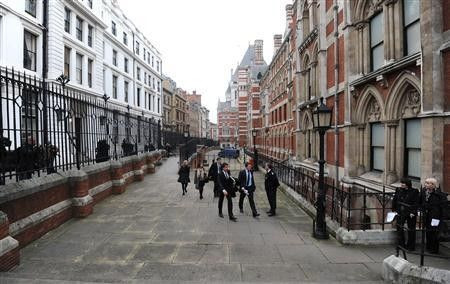UK Phone-Hacking Victims Condemn Intrusion

The parents of a murdered British schoolgirl pleaded on Monday for the country's newspapers to curb practices such as phone hacking and covert photography as a public inquiry into media standards turned the spotlight on the celebrity obsessed press.
The disclosure in July that a long-simmering row over phone hacking at Rupert Murdoch's News of the World tabloid had spread from celebrities to a murder victim provoked an national outcry that led to the closure of the newspaper.
Within days, his News Corp group withdrew its bid to buy the 61 percent of broadcaster BSkyB it did not already own; its British newspaper arm News International shut the 168-year-old paper and Prime Minister David Cameron ordered the inquiry.
To a silent court room, Sally Dowler told how she had suddenly become excited during the hunt for her daughter when she realized that phone messages left on Milly's phone were being deleted - thinking, falsely, she was still alive.
Bob Dowler said the family had felt hounded and afraid to leave their home, with journalists popping up from behind hedges to fire questions, and photographers taking pictures during intensely private moments.
It felt like such an intrusion into a really private grief moment, Sally Dowler told the central London court room.
The Dowlers, who have become key figures in the national debate about media practices, were appearing as the first witnesses in the inquiry as Hollywood stars and other high-profile figures unite to expose the press's tactics.
One would sincerely hope that News International and other media organizations would sincerely look very carefully at how they procure, how they obtain information about stories, Bob Dowler told the inquiry.
Because obviously the ramifications are far greater than just an obvious story in the press.
SHOCKING REVELATION
Another witness, columnist Joan Smith talked about how she had gone into shock when she saw the lengthy notes made about her by a private investigator working for the News of the World, detailing her movements and calls.
It seems to me that tabloid culture is so remorseless that the people involved have lost any sense that they are human beings, said Smith, who writes for Britain's broadsheets.
Smith described the British tabloids' obsession with celebrity sex scandals as infantile.
We do have a tabloid culture that is almost infantile in its attitude to sex and private life. My impression is that tabloid hacks go around like children who've just discovered the astonishing information that their parents have sex, she said.
Notting Hill actor Hugh Grant will speak later in the day, as a range of witnesses spell out how they and their families have suffered from a ruthless hunt for stories to boost flagging newspaper sales.
Graham Shear, a lawyer who has acted for famous footballers and entertainers, told the inquiry that the tabloid press had in recent years lost their ethical compass and become almost untouchable in their approach to dealing with the public.
Last Wednesday, the lawyer representing 51 clients who say they have suffered at the hands of the press delivered a withering critique of newspapers which he said had resorted to unacceptable, tawdry tactics to find exclusives.
Three of those he represents say they believed papers' hounding had contributed to family members committing suicide or attempting to kill themselves.
All were targeted to get stories to make money for the papers, he told the inquiry. That's why it was done: to sell newspapers. Not to detect crime or to expose wrongdoing, not to protect society or for the public good.
Most of the focus of the inquiry so far has fallen on News International, whose lawyer has admitted that phone-hacking was widespread until 2007, when one reporter was jailed, and possibly beyond.
However, lawyer David Sherborne has made it clear that all papers' activities deserve to be scrutinized and reformed.
The inquiry, headed by senior judge Brian Leveson and due to last a year, will make recommendations that could have a lasting impact on the industry, lead to tighter media rules or at least an overhaul of the current system of self-regulation.
Central to discussions will be what constitutes public interest, and whether paying for so-called kiss and tell stories about the private and sex lives of well-known figures could be justified.
© Copyright Thomson Reuters 2024. All rights reserved.





















